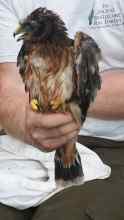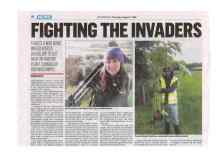This male was tagged on 7/7 at a site in the Ballyhoura Hills, North Cork, at approx. 28 days old. It’s nest site was in dense heather/gorse among 2nd rotation conifers, quite close to a used track high up the mountainside. This male was one of a brood of 3 that fledged successfully from the nest. After fledging he remained in the nest area for some weeks when he could be heard calling/begging for food and being fed by the adult female who was still on site.
This female was tagged on the 15th of July at an approximate age of 24-26 days. The nest was located at a traditional bramble and rush site in the Mullaghareirk Mountains in Co. Cork. Monitored by both staff and volunteers as part of IRD Duhallow’s RaptorLIFE project, the chick was in a brood of 2 and was the heaviest of all the 10 chicks tagged this year.
As part of this research 10 hen harrier chicks were tagged from ten different nests within the Slieve Blooms, Ballyhouras, Knockmealdown and Mullaghareirks mountains. Recent analysis of the incoming tracking data shows that that at least five of these birds are alive and well. Unfortunately, some of the tags are recording little to no activity (movement) indicating that these birds may have died. To date we have recovered one of the tagged chicks (a female from the Ballyhouras) but the precise cause of death was not conclusive.
Studying Irish hen harriers can be challenging. Many of us have taken part in the most recent national survey (2015) and enjoyed some great days out, perhaps the first sky-dancing male of the season or finding a pair at a new site or the first food-pass and female returning to a nest site. All this helps to give us a more or less complete picture of the status of Irish hen harriers and population trends over time (see Here). What has been shown to date is that nationally the species is declining while one or two subpopulations (eg. Slieve Blooms) appear to be relatively stable over time.
RaptorLIFE have been busy this summer monitoring hen harrier – a big thank you to all the volunteers who gave up many hours of their time to help out! The season culminated with a total of ten chicks satellite tagged, with four of those from the Duhallow region. This is a joint project between RaptorLIFE, the National Parks & Wildlife Service (NPWS) and the Irish Raptor Study Group.
Short-eared owls nesting next door to Kerry?
SIR, I would like to let readers of The Kerryman know more about a very rare bird – the short-eared owl – whose last confirmed breeding location within the Republic of Ireland was in Kerry in 1985. Short-eared owls have been seen on a number of occasions in East Kerry this summer by the RaptorLIFE project at IRD Duhallow (based in Newmarket). The RaptorLIFE project covers the Duahllow baronry which includes parts of North Cork, East Kerry and South Limerick.
FIGHTING THE INVADERS
The Himalayan balsam, which was originally introduced as an ornamental plant has left its presence known as it is now classified as an invasive alien species of EU concern.
However as part of IRD Duhallow’s conservation work, the RaptorLIFE project is fast tackling the invasive species along the 126 kilometres of river, with the ultimate long term aim of eradicating it from the Upper Blackwater Catchment.
Computer games are often blamed for children spending less time outside. However, the new app Pokémon Go, is taking the world by storm and may in fact be good for promoting nature. It has already contributed in a small way to public engagement with nature. While searching outside for computer generated Pokémon, many gamers have also encountered real-life animals along the way. The hashtag #pokeblitz recently emerged on Twitter as a way for biologists to connect with Pokémon Go players who wanted help in identifying the animals they came in contact with.
FREE EVENT - Led by Freshwater Ecologist Dr. David McCormick
When: Saturday 13th August 2016 - 11am to 4pm
Where: IRD Duhallow, James O'Keeffe Institute, Newmarket, Co.Cork
- 11am Presentation on Freshwater Ecology
- 12pm lunch provided
- 12:30 Interactive fieldtrip to investigate native fish and freshwater insects
REGISTRATION REQUIRED: If interested please contact the IRD Duhallow RaptorLIFE team on; Phone: 029 60633; Email: john.ballinger@irdduhallow.com











